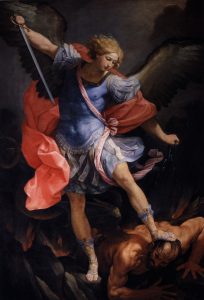
A state court in Massachusetts granted a preliminary injunction Oct. 14 blocking the planned installation of two large statues of Catholic saints outside the entrance of the new public safety headquarters in Quincy.
The ruling by the Norfolk Superior Court ensures that the statues of St. Michael and St. Florian will not be installed while a lawsuit challenging their display by government moves forward. The court also denied the City of Quincy’s motion to dismiss the lawsuit.
The lawsuit, Fitzmaurice v. City of Quincy, was brought in May by a multifaith group of community residents, who argue that the plan violates the separation of church and state, as codified in the Massachusetts Constitution. The plaintiffs are represented by Americans United, the American Civil Liberties Union of Massachusetts, the national ACLU, the Freedom From Religion Foundation and Cloherty & Steinberg LLP.
The legal action argues that the placement on government property of the proposed religious statues violates Article 3 of the Massachusetts Declaration of Rights by imposing religious imagery and symbols upon all who work in, visit or pass by the public safety building; by conveying the message that Quincy is a Catholic community and that non-Catholics do not belong and are less valued; and by excessively entangling the city with matters of religion.
In his ruling, Justice William F. Sullivan of the Superior Court emphasized that “[a] core function of the new public safety building is to facilitate and promote public access to law enforcement,” and that “[v]ictims and witnesses entering such a building often must overcome emotional and psychological hurdles, and intimidation to report crimes and seek police assistance” including “the question of whether the police will treat their claims with the gravity warranted and treat them equally as any other individual, regardless of religious beliefs.”
As a result, Sullivan concluded “the Complaint raises colorable concerns that members of the community not adherent to Catholicism or Christian teaching who pass beneath the two statues to report a crime may reasonably question whether they will be treated equally.”
“My Christian faith is at the core of my life — and the city’s plan to install religious statues at the entrance to a government building goes against that faith,” said Conevery Bolton Valencius, one of the plaintiffs in this case. “As residents of Quincy, we should not have to walk under such looming religious imagery to seek help from public safety officers or city services. I go to church because it is my choice to freely practice my religion, but having to walk beneath these statues to enter a government building removes that choice. The city should not be seen to favor religious believers — much less adherents to a particular faith — above others. I am grateful to the court for recognizing this essential principle.”